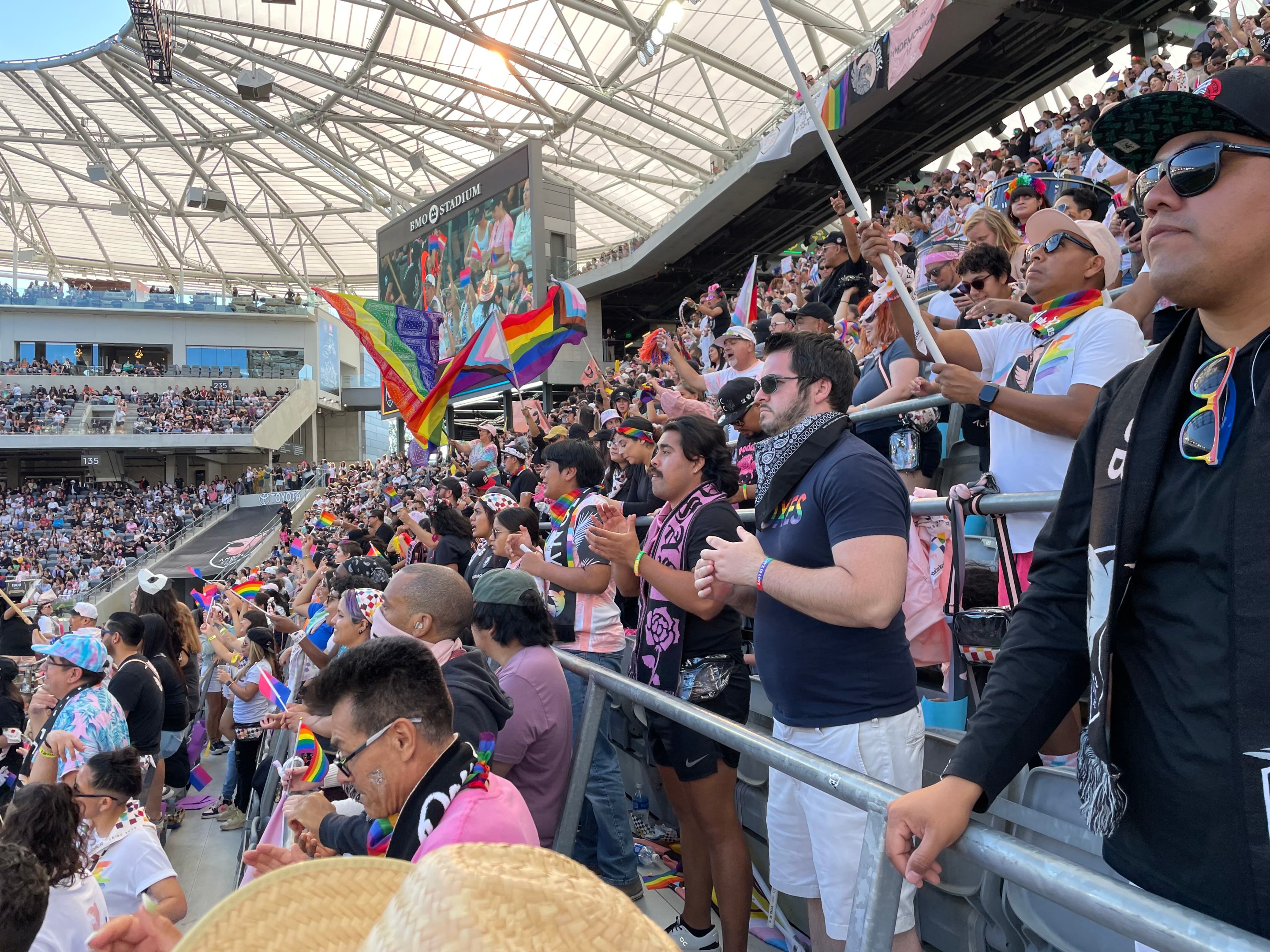At a recent Angel City Football Club match, PodeRosa ACFC member Dani Lugo stands behind her drum midway up BMO Stadium’s North End, sticks in hand, waiting for her cue from the capo down in front. There, PodeRosa ACFC co-founder Alma de Jesus stands atop the metal bars of a narrow box, facing the supporters, wearing a bright pink “Queer Resistance” graphic tee under a scarf with “PODEROSAS” spelled out in black Olde English lettering.
De Jesus raises her right hand and begins a countdown: Three, two, one, boom!
With a thunderous start, Lugo pounds her drum in unison with several other drummers, all led by their capos or hype-people, who bounce and point and lead everyone in the opening chant:
“We Are An-gel Ci-ty!”
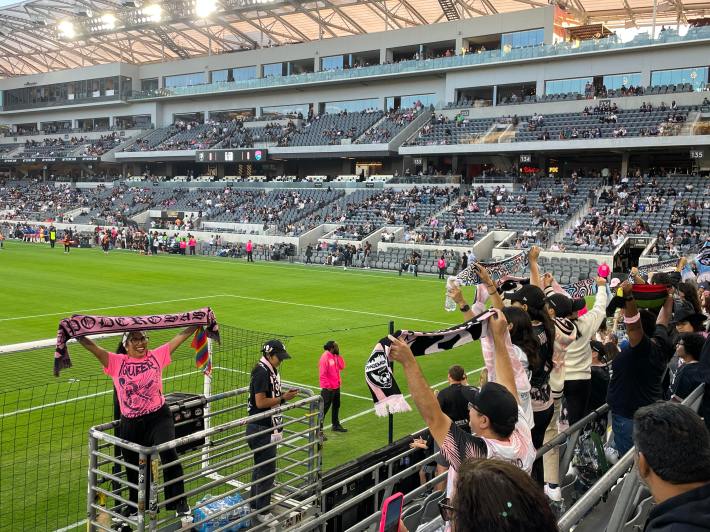
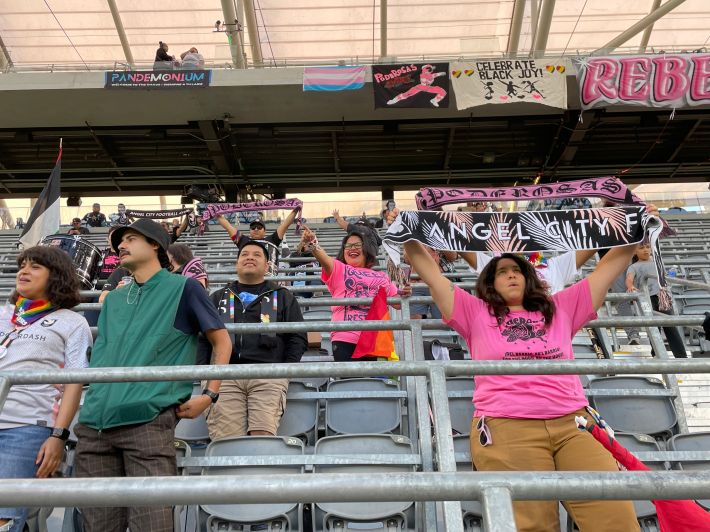
The PodeRosas are one of six official Angel City FC Supporter Groups, the organized fan clubs whose ebullient North End presence is the “lifeblood of the stadium.” They play lively drum beats, wave flags, and lead chants that electrify fans and pump up the players, creating a raucous match-day environment unique to professional soccer.
Like the other “SGs,” the PodeRosas do more than tailgate and cheer for ACFC at home and some away games. All supporter groups generally share the same value-driven goals of making soccer more inclusive of marginalized communities, while advocating for social causes and local organizations that align with the club’s equity and outreach missions.
What makes PodeRosas ACFC supporter group special to members like Lugo and de Jesus is its “for us, by us” barrio focus and its femme-first, family-friendly ethos that welcomes elders, kiddos, and everyone in between. With the PodeRosas, supporting ACFC is a “puro pinche pari” with a greater purpose—to uplift women’s professional soccer and harness its power to build a generational community beyond the stadium.
A Dream Come True
The PodeRosas were co-founded by six Eastside mujeres and fútbol fans in 2021, one year after the National Women’s Soccer League announced that a new team would be playing in Los Angeles starting in 2022.
Two co-founders, Daisy Chavez-Mendez, a legal aid worker at an immigrant law clinic, and Emily Grijalva, a mother, and educator, met through their work in the community and their membership in the Lxs Tigres del North End, a supporter group for the men’s Los Angeles Football Club (LAFC).
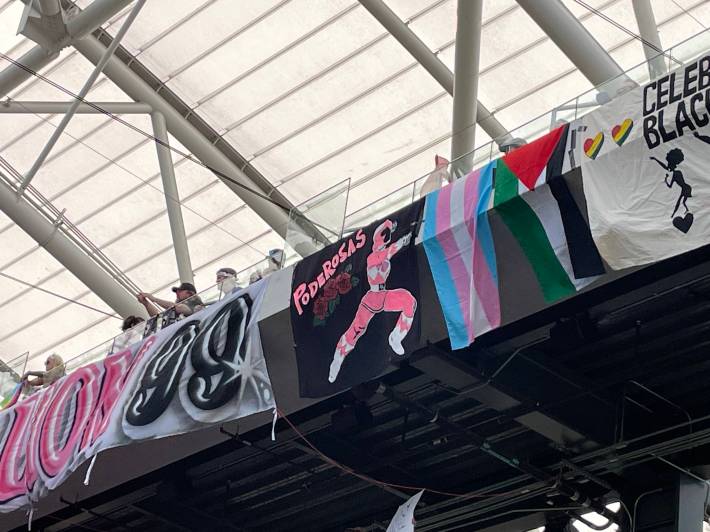
“We grew up loving soccer, cheering for soccer, playing soccer, and while we were members of Lxs Tigres del Norte, before Angel City was even named, we joined the efforts to push for a women’s soccer team here in L.A.,” Chavez-Mendez told L.A. TACO. “For a lot of us, Angel City is a dream come true.”
As Latina soccer fans intimately familiar with and critical of the male-dominated culture and atmosphere of fútbol on both sides of the border—Chavez-Mendez’s family supports Mexican teams, while Grijalva watched Guatemalan soccer with her uncle—the co-founders jumped at the chance to build a supporters’ group “for us, by us” when women’s pro soccer came to Los Angeles.
“Growing up, we mostly saw men playing soccer; our families mostly cheered for men’s teams,” said Grijalva. “We know how male-dominated soccer is. Our intention now is to center women athletes, women fans, women’s voices.”
According to their official supporter group page on the team’s website, PodeRosas “aims to create a supporter space in the soccer world that is led by and for women and femmes of color, one which is committed to values of care, social justice, and collective joy.”
“We are always advocating for our members and folks who usually wouldn’t be able to access a game at the stadium,” adds Grijalva. “We want to see more folks of color, more women, more Black folks especially, given the community that the stadium is in. We want to see fans not generally prioritized in men’s sports.”
Poderosa means “powerful” in Spanish, and the group breaks up the words “poder” and “rosas” to emphasize each. Their logo tells the story in a flash: a cluster of roses, framed by small black fists growing on a stem with thorns, the words “Del Barrio, Pa’l Barrio” curved above the name PodeRosas.
“Femmes of color started this group with the idea that we wanted to push those spaces to make sure our voices are heard,” Mendez-Chavez explained. “Men are welcome, but we intentionally used the feminine pronoun and in Spanish, Las PodeRosas, because it’s important for us to be visible and hold that space.”
Roses signify femininity, power, love, and something else for the group.
“A lot of us grew up working class, from immigrant families and neighborhoods,” said Grijalva. “We love our street vendors. We love our working families, so part of the reason why we chose the roses was to pay homage to the union struggles, like the labor slogan ‘give us our bread and roses.’”
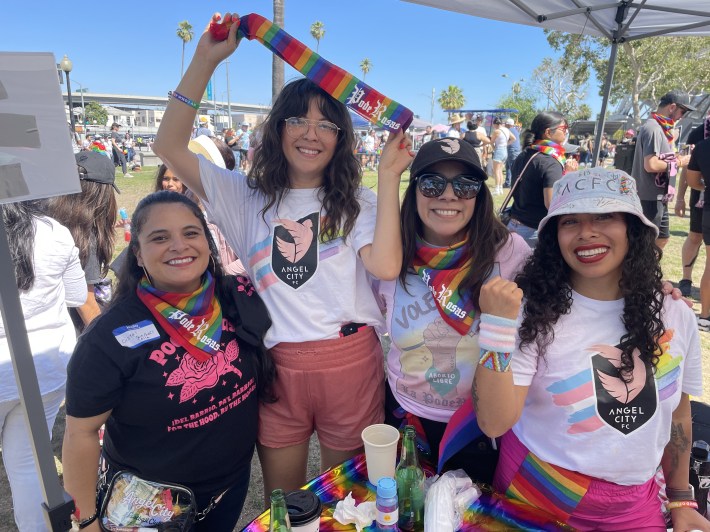
PodeRosa member Alejandro Catalán has been with the group “since the beginning” and one of several men in the group who support women’s sports in general and understand the significance of the “bread and roses” connection to the USWNT’s labor struggle.
“Women don’t get the same rep as men’s sports, but the U.S. women’s soccer team has accomplished so much more compared to the men’s team,” said Catalán. “They finally have equal pay, and that’s amazing. It’s finally progressing.”
For as much as the PodeRosas understand the power of promoting women’s soccer and attending games as a community, they also know that the cost of attending professional matches can be out of reach for many fans.
Chavez-Mendez speaks from personal experience: “When we were little girls, we wouldn’t be able to afford something like this. But we can do it now, and that’s more important to me than me being able to sit in club seats or wherever.”
They help families access games, starting with no-cost monthly memberships and subsidizing tickets for children and elders.
In these and other key ways, the PodeRosas have gained members and held to their values while uplifting the game that represents important family and community ties.
For Us, By US
Their group has grown from the six original co-founders to over one hundred in less than two seasons.
ACFC fan Ricky Gilweit joined the group a few months ago when he and his husband bought season tickets.
“I saw that PodeRosas were big with the LGBT community,” said Gilweit. “I am gay, and I wanted to be part of something that supports us in sports.”
Elianne Rodriguez, a fan from East L.A. who grew up in El Monte, has attended ACFC games last season and checked out other supporter groups. She joined last season after meeting Chavez-Mendez at LAFC games and learning more about PodeRosas’ outside activities.
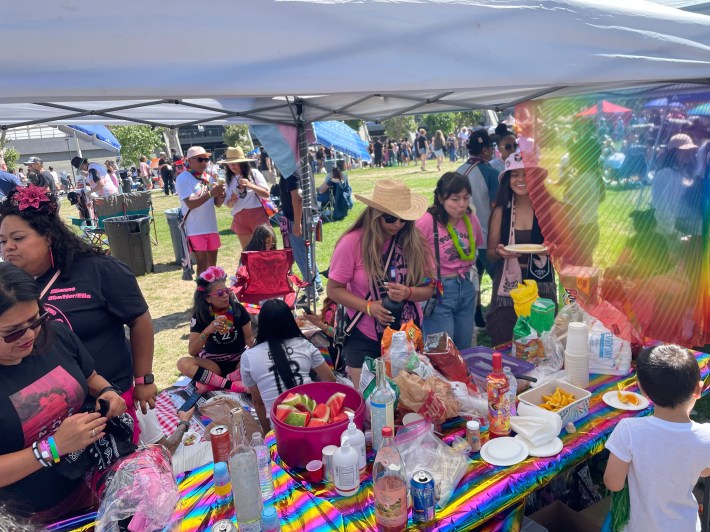
“They were doing more than just cheering on the team, like fundraising for the Special Olympics with the other SGs and doing other events for the community,” said Rodriguez. “We come for ACFC but stick around and hang out together.”
Lugo, the drummer, found PodeRosas through mutual friends. She bought ACFC season tickets as a way to invest in and show up for women’s pro soccer. She even revived her old high school drum-line skills for the cause.
“I played softball growing up, and what I could only dream of was maybe the Olympics or UCLA softball,” said Lugo. “But now, to be in these stands with a bunch of other people who are as passionate as I am about women’s sports and this team, I couldn’t have dreamed anything so wonderful as what we have here today.”
For Us, By Us
In its first season last year, Angel City sold out four home games at BMO Stadium, finishing with a “league-leading 19,105 fans per game.” This season, ACFC averages over 19,400 per game, an increase that reflects a growing interest in both the team and women’s soccer more generally.
The supporter groups contribute to the joyous atmosphere of ACFC home games that attracts thousands of fans every match. ACFC Head of Community, Catherine Dávila, spoke to L.A. Taco about the importance of the supporter groups to the team.
“The supporters’ section in the North End, or La Fortaleza as they call it, sets the tone for the stadium,” said Dávila. “They make game day something special. The dozens of hours they put in learning chants, practicing drums, making tifos, not to mention the 300-plus people who attended the San Diego away game where the team could hear ‘Dale, dale Angel City,’ that’s huge to the team.”
Dávila added, “If you’re curious about the supporters, buy a ticket in the section and start talking to anyone from any of the SGs, you’ll immediately be like family. That’s every group.”
The feeling of family attracted Marco Vieyra to the PodeRosas. Vieyra grew up watching soccer games in Mexico with his family and going to Galaxy games in Carson, but he was never part of a supporter group until joining PodeRosa.
“I’m here because it’s always a joy,” he said. “PodeRosas make going to games better. Our group got bigger, we got more connected, and it’s like they’re family now.”
For Nina Schwab, the PodeRosas create the energy she craves from fútbol.
“I’m from Brazil, so I’m a major fan of soccer,” said Schwab. “It’s different being in a supporter group because the emotions are higher and I love the energy.”
Myte Sosa became a member this season when a friend told her about a “Latinx supporter group with mostly women at the helm.” She met some PodeRosas last season and something clicked.
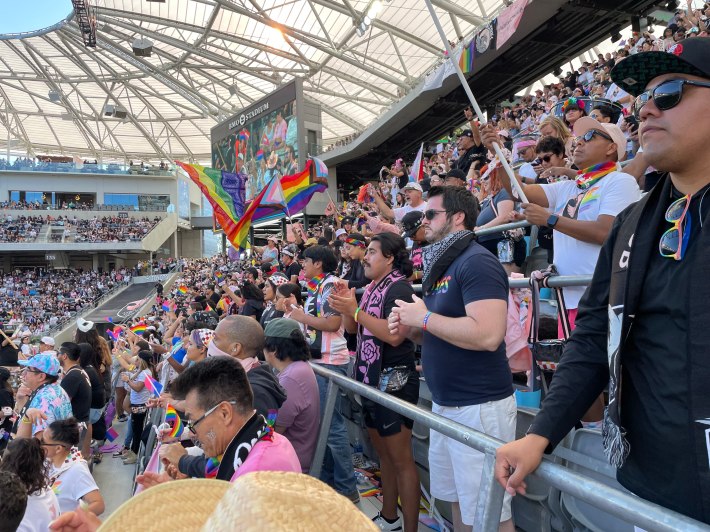
“I became a season ticket holder. I know I’ll have a great community to hang with at games,” she says. Sosa now hosts the group’s podcast, PodeRosa FC Radio, featuring interviews with founders as well as members’ post-game commentary.
We Are Thriving
For co-founder and drummer Claudia Hoffens, the PodeRosas ultimately represent a soccer space for imagining new ways to be and live in the world.
“We like to say, ‘How we show up to the game is how we show up in the world,’” says Hoffens, who grew up in South Central and lives in East L.A. “To imagine a soccer space that reflects all of L.A. and the world we want our kiddos to grow up in, that’s what motivated us to make this happen.”
For Rodriguez, a fan from El Monte, soccer has the power to unite people beyond the stadium.
“Soccer has to be a round game,” she said. “Yes, it’s about the game and players, but when we win or lose, what’s left? Community. We have a bigger purpose, to be part of something bigger than ourselves.”
That this “something bigger” is grounded in women’s soccer says something about the inherent value of women sports and athletes. And as this World Cup 2023 demonstrates, perhaps the world is finally catching up.
“We’re creating this space for future generations and to show what’s possible,” said Chavez-Mendez. “A lot of people told us that no one would come to these games, that the stadium would be empty, you won’t survive year one. And here we are, thriving.”
Angel City FC's next game is on Saturday, August 19th, at 4:30 PM.
